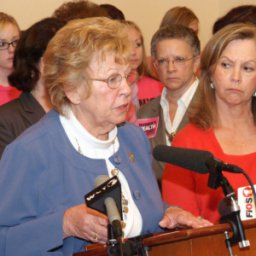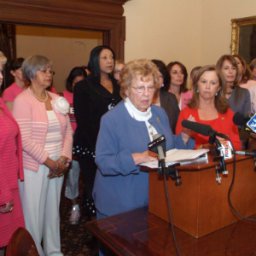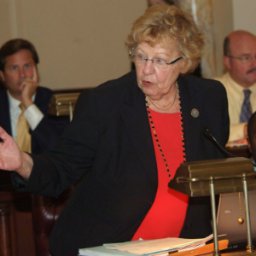Measure Would Also Require State to Seek Medicaid Expansion for More Low-Income Individuals to Access Family Planning Services
TRENTON – A bill sponsored by Senators Loretta Weinberg and Joseph Vitale which would reverse nearly $7.5 million in cuts in the Governor’s proposed FY 2011 Budget for women’s health and family planning services, and would require the State to apply to the federal government for a Medicaid expansion to make family planning services available to more low-income individuals was approved by the Senate today by a vote of 30-10. The Senate needs 27 votes in the affirmative in order to override a Governor’s veto.
“The people of New Jersey have a right to question whether the Governor’s decisions in the FY 2011 Budget are about fiscal realities or political ideology,” said Senator Weinberg, D-Bergen, and Chair of the Senate Health, Human Services and Senior Citizens Committee. “Governor Christie likes to point out that he was elected to represent all the people – including the thousands of women who depend on affordable, accessible health care through family planning clinics. Hopefully, he will recognize the impact of his cuts to family planning and women’s health services, and reverse course on proposed cuts which will put women at risk.”
“The funding in question provides cancer and gynecological screening to women without health insurance, helping to direct many into treatment before it’s too late,” said Senator Vitale, D-Middlesex, and vice chair of the Senate health panel. “This funding goes to pay for services to women who’ve been the victims of sexual assault, protecting them from further assault and abuse. At the end of the day, we simply have a responsibility as a society to fund these programs, and ensure that women can access the health care services they need, regardless of their insurance status or personal finances.”
The bill, S-2139, would restore the $7.5 million in grants to organizations providing family planning services and women’s health care in New Jersey that was cut from the Governor’s proposed FY 2011 Budget. The lawmakers noted that the $7.5 million in cuts to family planning services would restrict access to basic reproductive health for women across the State, including contraception, pregnancy detection, diagnosis and treatment of sexually transmitted diseases, routine gynecological and cancer screening, and other health services, including prenatal and postpartum care, menopausal services and infertility testing. The funds in question would not be used to cover abortions, according to the legislators.
The senators added that the bill is cost-neutral because an amendment to the bill identifies surplus funds in the State Employees’ Prescription Drug Program. In the Governor’s FY 2011 proposed budget, he projected that the program would grow by ten percent, while the non-partisan Office of Legislative Services has recently determined the projected growth to be around four percent. Senator Weinberg and Senator Vitale said that their amended bill would tap four percent of the Governor’s projected funding for the prescription program, leaving enough funding to meet the prescription program’s needs.
In addition to restoring the $7.5 million cuts to family planning services, the bill would require the State to apply for an expansion of Medicaid coverage, to allow women between 134 percent and 200 percent of the federal poverty level – or earning between $29,547 and $44,100 a year in income – to receive family planning services under the Medicaid program. The Senators noted that the recently enacted federal health care reform law created a state option to expand Medicaid services for individuals up to 200 percent of the poverty level, and that New Jersey would receive $9 in federal reimbursement for every additional $1 the State spends for family planning services through the State’s Medicaid program.
“When you consider the generous federal match for Medicaid services, funding these programs makes fiscal sense,” said Senator Vitale. “We’re in the midst of very difficult economic times, and we cannot afford to leave any money on the table when it comes to federal assistance for health care services for people in need. I don’t think we’re in any position as a State to turn away federal funding, and by tapping into a budget-neutral revenue source, we can provide more than enough funding to help women access health care.”
“We’ve identified a funding source that is budget neutral and preserves the Governor’s priorities in the FY 2011 Budget,” said Senator Weinberg. “Women’s health isn’t a budget buster, and will actually save the State money in the long-run, because it directs women into appropriate, cost-effective health care solutions, rather than the emergency room. We’ll find out soon enough whether Governor Christie is willing to put political ideology ahead of women’s health in the FY 2011 Budget.”
The bill now heads to the Assembly for consideration before going to the Governor to be signed into law. Should the Governor veto the measure, Senators Weinberg and Vitale expressed hope that their legislative colleagues that stood up for women’s health today would continue that support in a veto override attempt.




